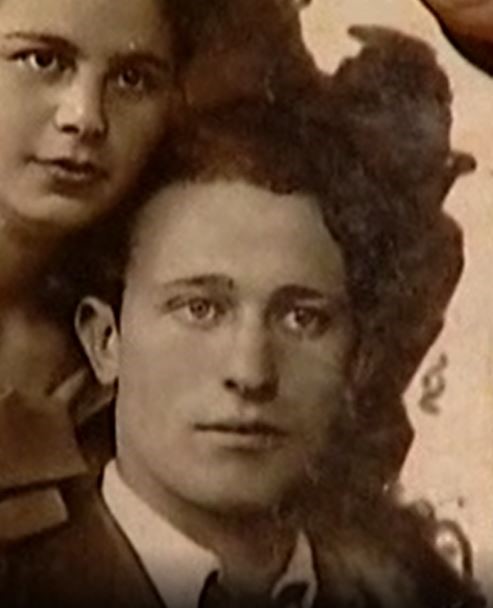Leonid Rivkin was born in Klintsy in western Russia, near the Belorussian and Ukrainian borders, as Isaak Rivkin, the second of four children. His father Yakov worked at a tannery, while his mother Beila was a part-time cook and salesperson at a bakery. After Isaak's birth, the family moved to the larger town of Briansk. For two years in his early childhood, Isaak received an elementary religious education, until his prudent parents took him away from the melamed. In 1933, Isaak became a factory worker, eventually beginning to work at a military plant. Shortly before the outbreak of the Soviet-German War, Isaak married.
As a worker in the defense industry, Isaak was not drafted into the Red Army after the Nazi invasion of the USSR on June 22, 1941. Following the air bombing of Briansk on August 25, 1941, Isaak's plant was evacuated to the Urals, and he went along with it. That winter, he was drafted into a ski battalion, but rejected because of his poor eyesight. However, a while later, in 1942, he was attached to the 7th Airborne Division, as a private in the communications company. In March 1943, his division was deployed in Staraya-Russa (northern Russia), where it took part in the abortive Staraya-Russa Offensive of the Red Army. While unwinding a telephone cable from the command post to the trenches, Isaak was wounded. After being discharged from the hospital, he was sent to a rear reserve regiment; however, since the army needed paratroopers with knowledge of communications, he was transferred to the 3rd Airborne Brigade. In October 1943, after an additional period of training, he was returned to frontline duty in central Ukraine, where the Red Army was crossing the Dnieper River. Rivkin's diversionist group was airdropped behind enemy lines. However, because of a mistake by the pilot, the group was dropped in the wrong location, and all of its members were taken prisoner by the Germans. Isaak Rivkin was sent to a POW camp near Kanev. There, he gave his name as Leonid Shmaga, an ethnic Russian. He was transferred between camps several times. On one occasion, he was recognized as a Jew by his German captors: While being moved to another camp, the hungry "Leonid" saw a piece of bread lying on the ground, and he asked the German guard for permission to pick it up; he used the Yiddish word "breit", instead of the German "Brot".
The guardsman said:
"Only the Berlin Jews say 'breit'!", but did not do anything. 1
Rivkin's last camp was in Poland, in the area of Radom. He was liberated from it by the advancing Red Army.
Leonid (who chose not to restore his Jewish first name, Isaak) was screened by SMERSh (the anti-spy agency of the Red Army), and was then recruited by the reconnaissance. He was attached to the 134th Rifle Division, took part in the crossing of the Oder River in the winter of 1944-1945, and met V-E Day in Berlin. He was awarded the Order of Glory, 3rd class, for capturing a German informant in 1945, as well as some medals.
In 1946, Leonid Rivkin was discharged from the Red Army, and he returned to Briansk. His parents and siblings had evacuated in 1941 and survived the war. He went on to work at various factories.
- 1. YVA O.93/27630

